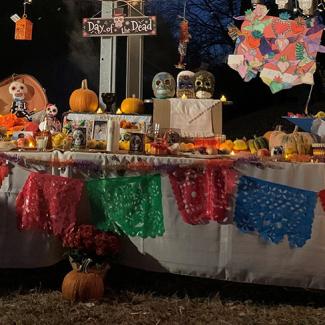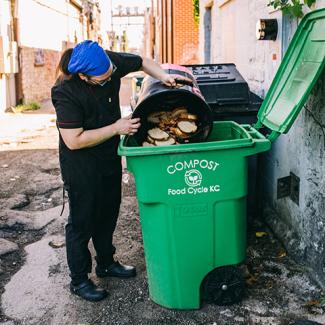In 2017, when the Douglas County Food System Plan (FSP) was first adopted, Common Ground, the City of Lawrence’s urban gardening and farming program, was already an established and robust effort, serving hundreds of local food growers across multiple sites. Now in its 10th year, it continues to grow with the help of multiple grants, community partnerships and new initiatives, on track to meet the FSP’s objective to “expand agriculture and community-based food production,” with the continued emphasis to “engage underserved communities.”
The City of Lawrence, with leadership from the joint Lawrence-Douglas County Sustainability Office and Lawrence Department of Parks and Recreation, established the Common Ground program in 2012, providing residents underutilized properties for use as community gardens for minimal cost in order to eliminate land ownership as a barrier to growing fresh produce; to promote access for all community members to fresh and locally grown food and to establish and sustain a healthy urban ecosystem; and to build community.
In 2022, Common Ground was providing approximately 9.5 acres of food-producing space across 10 distinct sites - 9 community gardens and an incubator farm - serving more than 225 gardeners, 11 farmers and upwards of 265 visitors that volunteer or harvest from community areas.
Federal funds afford a big leap forward
By far the biggest leap in Common Ground’s expansion efforts was made possible through a Natural Resources Conservation Service grant Douglas County received in 2021. While the Common Ground program had already solved one critical barrier to food production—lack of access to land, participants of the program were continuing to express the need for education and technical assistance to learn conservation agriculture skills for a more resilient local food system.
The grant allowed Douglas County to hire a full-time Common Ground Program Manager in March 2022. Through the three years of the project, staff and partners will implement workshops, on-site demonstration projects, direct technical assistance and a beginning farmer apprenticeship. The workshops and demonstration projects will focus on six sustainable agriculture topics—cover crops, season extension, pollinator habitat, water conservation, soil fertility management and sustainable weed management.
Making stronger Indigenous connections
In spring of 2022, the Indigenous Community Center (ICC) of Lawrence joined Common Ground’s Incubator Farm, launching a project designed to promote autonomy, access to healthy foods, and Indigenous land stewardship practices.
“This is a community-based program, and it’s really about taking back space and being able to practice Indigenous farming techniques,” said Robert Hicks, ICC chair and a member of the Pyramid Lake Paiute Tribe of Nevada.
During the 2022 growing season, ICC hosted weekly farm volunteer work days, bringing together Indigenous farmers, families and members of various community organizations.
“I like to focus on what we bring to the community as far as togetherness and healing and reconnecting through Mother Earth,” Moniqué Mercurio, an ICC vice chair and committee head of the Navajo and Esselen nations, told The Lawrence Times. “Especially during COVID, it’s important to provide an environment where our youth can get reconnected in an old way that’s sometimes forgotten in the hustle and bustle of the colonized world we’re so used to. I think the youth will fall right in with feeling a sense of belonging, because we have such a wide variety of people joining this project.”
Creative community benefits make a huge impact
From its inception, one of the requirements of the Common Ground program has been for each site to to set an intention to give back to the community. Over the last decade, Common Ground gardens have hosted dozens of tours and community events, maintained community-pick areas for open access by visitors and donated excess produce to area food pantries. By 2018, the Common Ground program’s annual donations to food banks neared 2,000 pounds.
In 2018, Little Prairie Community Garden (LPCG) launched a donation garden and orchard with the sole purpose of growing produce to donate to citizens who are food insecure.
“The donation garden has grown significantly and, in 2021, has donated over 7,000 pounds of fresh produce to our community. We project increasing the donation amount to 10,000 pounds by 2025, significantly increasing community access to fresh, locally grown produce,” said Christy McMurphy, LPCG co-manager.
Nourishing the youngest growers
Perhaps one of the most creative partnerships is the one between Common Ground, the Ballard Early Childhood Education Center and Somos Lawrence, a grassroots organization that advocates for effective and culturally-informed outreach to non-English residents of Douglas County, and with specific attention to Spanish speakers.
Since 2020, the Ballard Center, with the help of Somos Lawrence volunteers, has incorporated gardening into its curriculum, bringing students to the Garden at John Taylor Park, where they plant, care for and harvest sweet potatoes.
The teachers and volunteers cure the sweet potatoes to be used for cooking at the school’s cafeteria and send children home with a kit that includes a recipe book, sweet potatoes and other children’s books.
“Since we started this program, the teachers said they started noticing the children’s eating habits changing,” said Araceli Masterson, Somos Lawrence organizer and John Taylor gardener. “After seeing the produce in the garden, the children started eating more veggies.”
After running the program with individual donations for two years, Ballard Center and Somos Lawrence were awarded a grant by Douglas County Heritage Conservation Council in 2022, enabling not only the food education curriculum to continue, but also securing funding for two community celebrations, both stemming from traditional festivities in Mexico and Central America: Day of the Dead, a collective ritual of remembrance tied to the harvest; and Day of Spring, a celebration of the planting season.
“Having that grant support is really nice because we know we can continue to do the things that the kids enjoy so much,” Masterson said.
Expanding the footprint
In addition to the federal funds that helped the program grow by adding full-time staff, educational programming and direct technical assistance, Common Ground became a grant subject and partner for the Lawrence-Douglas County Public Health in 2022.
The Kansas Department of Health and Environment’s Chronic Disease Risk Reduction grants are awarded to communities to address risk factors for chronic disease, such as tobacco use, nutrition and physical activity. Laura McCulloch, a former health equity specialist with the health department and a member of the Douglas County Food Policy Council, through conversations with the FPC’s Health Equity working group and the Sustainability Office, decided expanding Common Ground with a new location would have the most community benefit.
“The goal of the grant is to engage underserved residents in public local food programs,” McCulloch said. “So, looking through an equity lens as the way we were guiding these improvements, how can we make this more accessible to more people in the community?”
Public Health brought in a consultant to engage with community organizations about the barriers they see to community gardening and gathered feedback through a public survey and multiple community events over several months.
In June 2022, Common Ground announced the addition of a new garden site to be located at Broken Arrow Park, at 3100 Louisiana St. The garden will be built in fall of 2022 and ready for the 2023 growing season.
“Having just started my position in March and already being gifted a new garden site is so exciting,” said Umut Bayramoglu, Common Ground Program Manager. “With these amazing community partnerships and initiatives, Common Ground is set to accomplish big things in the next few years—as our state motto says, Ad astra per aspera!”
Contributors: Umut Bayramoglu, Common Ground Program Manager, Douglas County Sustainability Office. Umut is a graduate of William Allen White School of Journalism and Mass Communications at the University of Kansas. She has been urban kitchen gardening for nearly two decades and her pollinator garden in East Lawrence is a certified monarch waystation by KU’s Monarch Watch.


